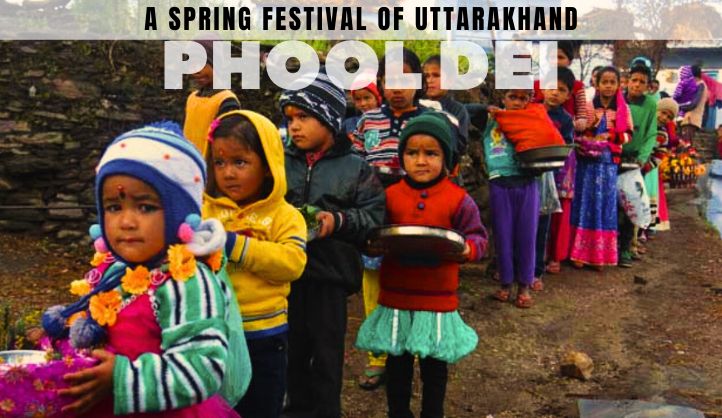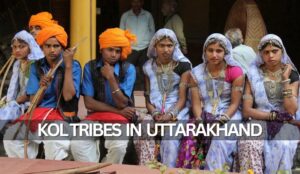Phool Dei is a spring festival celebrated in the Garhwal and Kumaon regions of Uttarakhand, India. It is a harvest festival that marks the end of the winter season and the beginning of the spring season. The festival is celebrated on the first day of the month of Chaitra, which falls in March or April.
Here are some of the customs and traditions associated with Phool Dei:
- Girls collecting flowers: Young girls go door-to-door collecting flowers from the houses. They decorate their hair and clothes with flowers and sing songs about the beauty of spring.
- Decorations: The houses and temples are decorated with flowers.
- Prayers: Farmers offer prayers to the gods for a bountiful crop year.
- Celebration of animals: The hard work and dedication of animals is celebrated.
Origins and Significance
Phool Dei, also known as Phoolyari or Basant Panchami, is a harvest festival celebrated in the Garhwal and Kumaon regions of Uttarakhand. The name ‘Phool Dei’ itself translates to ‘giving of flowers’, aptly capturing the essence of the festival. It falls on the first day of the month of Chaitra, which typically coincides with March or April, coinciding with the blooming of numerous flowers across the region.
The festival holds deep significance for the people of Uttarakhand, as it marks the end of the harsh winter season and the beginning of the vibrant spring. It is a time to express gratitude for the abundant harvest, seek blessings for the upcoming year, and celebrate the beauty of nature’s reawakening.
Festive Delights and Customs
Phool Dei is a symphony of colors, music, and laughter, with festivities that span for a month. The air is filled with the sweet fragrance of blossoming flowers, and the streets come alive with vibrant processions and cultural performances.
In the days leading up to the festival, women and children gather a variety of flowers, including rhododendrons (buransh), marigolds, and cherry blossoms. These flowers are then used to decorate homes, temples, and public spaces, creating a kaleidoscope of colors that reflect the spirit of spring.
On the main day of Phool Dei, the celebration reaches its peak. Young girls, adorned with garlands of flowers, go from house to house, singing traditional songs and offering blessings to the residents. They receive sweets and gifts in return, adding to the festive cheer.
Another highlight of Phool Dei is the preparation of special delicacies, such as ‘Gulgula’, a sweet dish made from jaggery and flour, and ‘Phool Bhaji’, a dish of mixed vegetables cooked with flowers. These culinary delights add a touch of sweetness to the festivities.
Environmental Consciousness and Sustainability
Phool Dei is not just a celebration of spring; it is also a reminder of the delicate balance between humans and nature. The festival instills a deep sense of environmental consciousness among the people, encouraging them to protect and cherish the natural world.
The use of natural flowers, the focus on eco-friendly decorations, and the emphasis on sustainable practices during the festival all contribute to its harmonious coexistence with the environment. Phool Dei serves as a testament to the deep-rooted connection between the people of Uttarakhand and their land.
Cultural Significance and Tourism Potential
Phool Dei is a vibrant tapestry of traditions, customs, and beliefs that reflect the rich cultural heritage of Uttarakhand. It is a celebration that binds communities together, fostering a sense of unity and shared identity.
The festival also holds immense tourism potential, drawing visitors from across the country and beyond to witness the splendor of Uttarakhand’s spring and experience the unique customs of the region. It provides a platform to showcase the state’s natural beauty, cultural diversity, and warm hospitality.
Conclusion
Phool Dei is a significant festival in Uttarakhand. It is a time for people to celebrate the beauty of nature and the bounty of the land. It is also a time for families and friends to come together and enjoy each other’s company.
FAQs
1. What does the name “Phool Dei” mean?
The name “Phool Dei” means “giving of flowers”. This is because young girls go door-to-door collecting flowers from the houses on the day of the festival.
2. What are some of the environmental benefits of Phool Dei?
Phool Dei is an eco-friendly festival. The use of natural flowers, the focus on sustainable practices, and the emphasis on environmental consciousness during the festival all contribute to its harmonious coexistence with the environment.
3. What are some of the cultural benefits of Phool Dei?
Phool Dei is a vibrant tapestry of traditions, customs, and beliefs that reflect the rich cultural heritage of Uttarakhand. It is a celebration that binds communities together, fostering a sense of unity and shared identity.
4. What is the tourism potential of Phool Dei?
Phool Dei holds immense tourism potential, drawing visitors from across the country and beyond to witness the splendor of Uttarakhand’s spring and experience the unique customs of the region. It provides a platform to showcase the state’s natural beauty, cultural diversity, and warm hospitality.
5. When is Phool Dei celebrated?
Phool Dei is celebrated on the first day of the month of Chaitra, which typically coincides with March or April.






